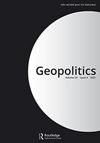比较独立公投:为什么有些国家接受而有些国家不接受?
IF 3
1区 社会学
Q1 GEOGRAPHY
引用次数: 0
摘要
ABSTRACT 本文旨在解释为什么一些中央政府同意举行独立公投,而另一些中央政府却拒绝这样做。为此,本研究从有争议主权数据集的更新版本中提取了 1944 年至 2021 年间 131 个国际分离协商案例,对其中的七个假设进行了评估。逻辑回归模型的结果确定了四个相关变量。首先,竞争/邻近模型和时间变量解释了中央政府对组织自决公投的支持。此外,研究还表明,民主的质量影响着允许少数民族举行独立协商的决定。最后,在显著性水平较低的情况下,研究还认为以前的暴力时期会促使东道国当局同意举行自决全民投票。本文章由计算机程序翻译,如有差异,请以英文原文为准。
Comparing Independence Referendums: Why Do Some States Accept Them while Others Do Not?
ABSTRACT This article aims to explain why some central governments accept to hold independence referendums while others refuse to do so. For this purpose, this investigation assesses a series of seven hypotheses on 131 international cases of secession consultations from 1944 to 2021 extracted from an updated version of the Contested sovereignty dataset. The results of the logistic regression model identify four relevant variables. In the first place, the competition/proximity model and the time variable explain the support brought by central governments for the organisation of self-determination referendums. Additionally, the study shows that the quality of democracy influences the decision to allow minorities to hold independence consultations. Finally, and with a lower level of significance, it is also argued that periods of previous violence incite host state authorities to agree to hold self-determination referendums.
求助全文
通过发布文献求助,成功后即可免费获取论文全文。
去求助
来源期刊

Geopolitics
Multiple-
CiteScore
7.60
自引率
10.30%
发文量
50
期刊介绍:
The study of geopolitics has undergone a major renaissance during the past decade. Addressing a gap in the published periodical literature, this journal seeks to explore the theoretical implications of contemporary geopolitics and geopolitical change with particular reference to territorial problems and issues of state sovereignty . Multidisciplinary in its scope, Geopolitics includes all aspects of the social sciences with particular emphasis on political geography, international relations, the territorial aspects of political science and international law. The journal seeks to maintain a healthy balance between systemic and regional analysis.
 求助内容:
求助内容: 应助结果提醒方式:
应助结果提醒方式:


